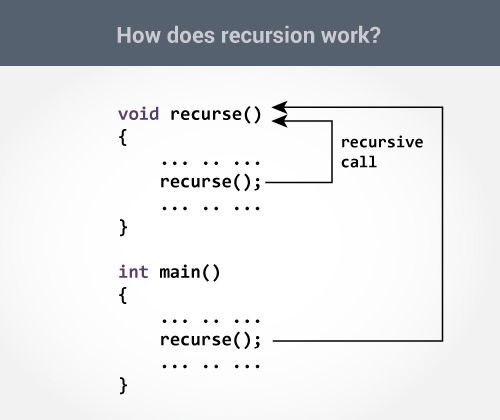A function that calls itself is known as a recursive function. And, this technique is known as recursion.
How recursion works?
void recurse()
{
... .. ...
recurse();
... .. ...
}
int main()
{
... .. ...
recurse();
... .. ...
}The recursion continues until some condition is met to prevent it.
To prevent infinite recursion, if...else statement (or similar approach) can be used where one branch makes the recursive call, and other doesn't.
Example: Sum of Natural Numbers Using Recursion
#include <stdio.h>
int sum(int n);
int main() {
int number, result;
printf("Enter a positive integer: ");
scanf("%d", &number);
result = sum(number);
printf("sum = %d", result);
return 0;
}
int sum(int n) {
if (n != 0)
// sum() function calls itself
return n + sum(n-1);
else
return n;
}
Output
Enter a positive integer:3 sum = 6
Initially, the sum() is called from the main() function with number passed as an argument.
Suppose, the value of n inside sum() is 3 initially. During the next function call, 2 is passed to the sum() function. This process continues until n is equal to 0.
When n is equal to 0, the if condition fails and the else part is executed returning the sum of integers ultimately to the main() function.
Advantages and Disadvantages of Recursion
Recursion makes program elegant. However, if performance is vital, use loops instead as recursion is usually much slower.
That being said, recursion is an important concept. It is frequently used in data structure and algorithms. For example, it is common to use recursion in problems such as tree traversal.







No comments:
Post a Comment